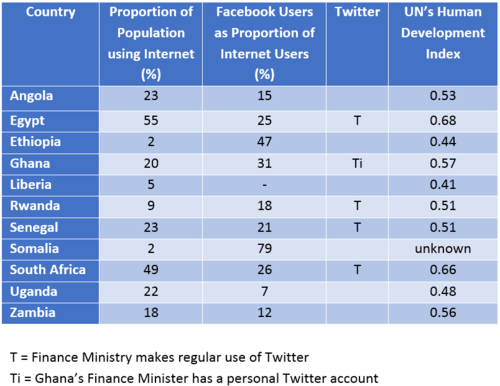
Posted by David Fellows and John Leonardo[1]
What contribution does the Social Media have to make to improving PFM and fiscal transparency? In a recent study, we found that 26 of the 34 OECD states had Twitter sites and 18 had a Facebook presence.[2] Further work on African countries revealed that 11 finance ministries have active Facebook accounts (Angola, Egypt, Ethiopia, Ghana, Liberia, Rwanda, Senegal, Somalia, South Africa, Uganda and Zambia) with four of these using Twitter on a regular basis (see table below). The number of African Facebook accounts stood at 51.6 million as at 31st December 2012 and more than doubled to 120million by 30 June 2015. Nigeria, South Africa and Kenya accounted for a quarter of this total but other African countries have been gaining ground. There appears to be a moderate correlation between internet use and per capita GDP for the group (excluding Somalia).
A large number of Facebook postings in these countries has an economic or financial content. For instance, Zambia’s Minister of Finance emphasises the importance of female employment, advocates the need for greater diversification into agriculture, manufacturing and non-extractive industries, and quotes a World Bank report on the need for major companies to support the development of small businesses. The Angolan finance ministry explains how falling oil prices have put pressure on public spending causing fuel subsidies to be reduced to maintain vital services, and stresses the importance of the linkage between economic stability, rating agency assessments and debt funding. Most countries provide details of budget spending proposals.
Some finance ministries are becoming quite adventurous in their postings. Zambia, Uganda and Liberia refer to prosecutions for tax fraud and corruption and this news was well received by the public. Liberia refers to its Open Budget Initiative and encourages the public to access budget material online. Angola, Liberia and Zambia refer to their PFM reform intentions. South Africa requests ideas for budget preparation. Angola refers specifically to its intentions to improve tax collection and procurement practices. Egypt makes regular announcements about training courses, and is also a regular user of video clips.
Several countries receive a regular flow of public comments, ranging from appreciative to openly hostile. Zambia demonstrates a lively interaction. Its citizens clearly have the confidence to express both appreciation and scepticism depending on the context. Its site is varied in subject matter, photographs are often interesting and the postings are regularly updated. Not surprisingly it also has the most hits.
Social Media is a hard task master. At best, it requires strong images and short explanations. Laborious text pieced together from formal speeches or official documents is not an ideal format. Further reading can be offered but should not be used to carry the initial message if the intention is to engage the casual browser. Attention must be won.
At present, finance ministry website visits originating from Social Media are very limited (Egypt at 11% being the highest but for most websites the traffic is negligible). On the other hand, given the rapid growth in Social Media use, particularly Facebook, there is huge potential for using this communication channel as a gateway to website-based information and online service delivery.
Politicians in some countries have begun to fear Social Media for its capacity to spread discontent and inflame communities. So why should finance ministers choose to use Social Media? Perhaps because it is one of the few ways that politicians can hope to reach the younger generation in significant numbers at a time when the general level of confidence in government appears to be low and decreasing. The OECD study referred to earlier found that only 40% of adults in OECD countries expressed trust in their governments. Should we expect the experience in developing countries to be different?
The same OECD study found that 30% of young people in Holland used Social Media to discuss politics and civic issues. This was the highest ratio of any country but it does suggest that Social Media is already a relevant political vehicle. If they choose to grasp this opportunity, finance ministers may find they can use Social Media to increase public understanding of public finance and budgeting, expand the opportunities for engaging the private sector in business partnerships with the government, and even improve the willingness to pay taxes.
If this is a reasonable supposition then perhaps development partners and even private sector investors will begin to take an interest in the potential relevance of Social Media.
[1] The authors are Principals of PFMConnect. They have been engaged on projects in Africa, Asia and the Pacific funded by the World Bank, EU, ADB and DfID.
[2] OECD Working Paper on Public Governance, No. 26 “Social Media Use by Government”.
Note: The posts on the IMF PFM Blog should not be reported as representing the views of the IMF. The views expressed are those of the authors and do not necessarily represent those of the IMF or IMF policy






